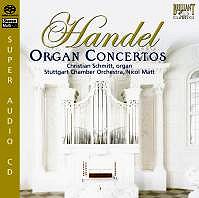I’m not sure whether
these forces have set down the complete
organ concertos but this represents
a sampler, on SACD. There are two concertos
from the earlier Op.4 collection, one
from the second Op. 7, the A major HWV
296a and the B flat major Harp Concerto
(Op.4 No.6 – its original guise before
being reworked as one of the sixteen
organ concertos). As such its claims
on the catalogue are precarious – collectors
will presumably want complete sets of
Opp. 4 and 7 – and depend more than
usually on executant ability.
The balance isn’t always
perfect, a notoriously tricky business
in organ concertos, but the string lines
are moulded with warmth and zest. Compared
with Preston and Pinnock, Schmitt and
Matt tend to prefer a rather more clipped,
reserved presence in the concertos.
The organist enters Op.7 No.4 rather
stealthily, for example, whereas the
older English pairing are more robust
and full of detail. Then again there’s
more bite in the lower strings in the
Pinnock/Preston traversal. True their
organ sounds heavier whilst Schmitt’s
Mühleisen of 1992 is brighter -
maybe a touch too bright. However the
German team fare rather less well in
the same concerto’s Allegro finale where
their string moulding lacks the kind
of acutely phrased intelligence that
gave such life to that Archiv set.
In Op.4 No.1 we hear
again that the Stuttgart performance
is rather smaller-scaled than, say,
Peter Hurford’s recording on a 1976
Blank in Papendrecht in his traversal.
Orchestral finesse is in greater evidence
there, with Joshua Rifkin leading the
Concertgebouw Chamber Orchestra with
admirable incision. Op.4 No.3 is a bit
of a moveable feast – the Stuttgart
team performs the three-movement version
– and fine though Charlotte Balzereit’s
playing of the Harp Concerto is it may
have made more sense to have kept this
to an all-organ concerto disc.
A word about the ad-lib
organ parts; Schmitt’s are, in keeping
with his performance, tasteful and unfailingly
musical but also noticeably less free
than Hurford’s and Pinnock’s. The latter
organists also extend their ad lib passages
to greater length than their young German
colleague.
The SACD sounds well
enough on my ordinary set-up and the
notes are cogent and in English. One
more for admirers of the soloists and
the group since enough mid-price traversals
of the complete set exist to make this
entrant seem less pressing on the wallet.
Jonathan Woolf











